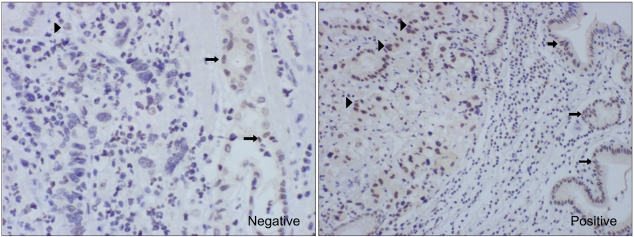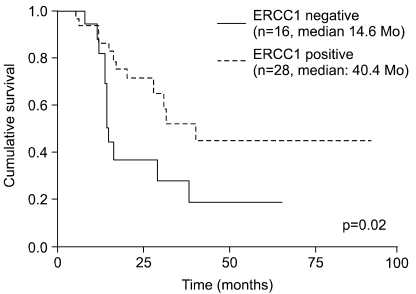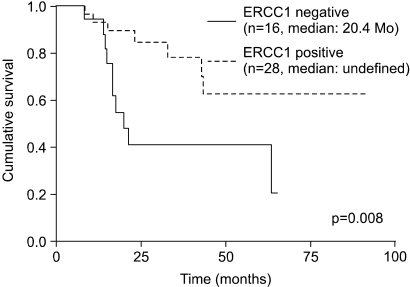Cancer Res Treat.
2006 Feb;38(1):19-24.
Increased ERCC Expression Correlates with Improved Outcome of Patients Treated with Cisplatin as an Adjuvant Therapy for Curatively Resected Gastric Cancer
- Affiliations
-
- 1Departments of Internal Medicine, Cancer Research Institute, Kyung Hee University College of Medicine, Seoul, Korea. sykim55@chol.com
- 2Departments of Anatomical Pathology, Cancer Research Institute, Kyung Hee University College of Medicine, Seoul, Korea.
Abstract
- PURPOSE
It has been reported that the overexpression of the excision repair cross-complementing 1 (ERCC1) gene, which is essential for the repair of cisplatin (CDDP)- DNA adducts, negatively influences the effectiveness of CDDP-based therapy for primary gastric cancer. We investigated whether the ERCC1 expression was associated with survival for gastric cancer patients in an adjuvant setting.
MATERIALS AND METHODS
We retrospectively analyzed 44 patients who were diagnosed with stage II or higher disease after undergoing curative resection and they had also received cisplatin-based chemotherapy. The ERCC1 expression was examined by performing immunohistochemical (IHC) staining, and this was divided into two groups according to the percentage of IHC staining of the tumor cell nuclei (negative: 10% or less, positive: more than 10%).
RESULTS
Among the 44 patients (ERCC1-negative/ERCC1-positive group=16/28), 32 patients were male and their median age was 52 years. There was no difference for the baseline characteristics of the two groups. The median follow-up duration was 41 months. The median disease-free survival (DFS) and the overall survival (OS) for the ERCC1-positive group were significant higher than those of the ERCC1-negative group (DFS: 40.4 vs. 14.6 months, p=0.02, OS: undefined vs. 20.4 months, p=0.008).
CONCLUSION
The overall survival in gastric cancer patients who received cisplatin-based adjuvant chemotherapy after a curative resection is higher in those patients showing the overexpression of the ERCC1 gene. However, prospective studies using the ERCC1 gene expression as a prognostic marker for the DNA repair activity are needed.
Keyword
MeSH Terms
Figure
Reference
-
1. Shin Hr, Won YJ, Jung KW, Park JG. 2001 Annual report of the korea central cancer registry: based on registered data from 134 hospitals. Cancer Res Treat. 2004; 36:19–30.
Article2. Richard P, Lawrence RC, William JH, Lawrence D. Wagman gastric cancer. Cancer management. 2004. 5th ed. NY: CMP media LLC;p. 259–272.3. Rosenberg B, VanCamp L, Krigas T. Inhibition of cell division in Escherichia coli by electrolysis products from a platinum electrode. Nature. 1965; 205:698–699. PMID: 14287410.
Article4. Higby DJ, Wallace HJ Jr, Albert DJ, Holland JF. Diaminodichloroplatinum: a phase I study showing responses in testicular and other tumors. Cancer. 1974; 33:1219–1225. PMID: 4856724.
Article5. Janunger KG, Hafstrom L, Nygren P, Glimelius B. A systematic overview of chemotherapy effects in gastric cancer. Acta Oncol. 2001; 40:309–326. PMID: 11441938.
Article6. Earle CC, Maroun JA. Adjuvant chemotherapy after curative resection for gastric cancer in non-Asian patients: revisiting a meta-analysis of randomized trials. Eur J Cancer. 1999; 35:1059–1064. PMID: 10533448.7. Hermans J, Bonenkamp JJ, Boon MC, Bunt AM, Ohyama S, Sasako M, et al. Adjuvant therapy after curative resection for gastric cancer: meta-analysis of randomized trials. J Clin Oncol. 1993; 11:1441–1447. PMID: 8336183.
Article8. Bramson J, Panasci LC. Effect of ERCC-1 overexpression on sensitivity of Chinese hamster ovary cells to DNA damaging agents. Cancer Res. 1993; 53:3237–3240. PMID: 8324733.9. Lee KB, Parker RJ, Bohr V, Cornelison T, Reed E. Cisplatin sensitivity/resistance in UV repair-deficient Chinese hamster ovary cells of complementation groups 1 and 3. Carcinogenesis. 1993; 14:2177–2180. PMID: 8222071.
Article10. Metzger R, Leichman CG, Danenberg KD, Danenberg PV, Lenz HJ, Hayashi K, et al. ERCC1 mRNA levels complement thymidylate synthase mRNA levels in predicting response and survival for gastric cancer patients receiving combination cisplatin and fluorouracil chemotherapy. J Clin Oncol. 1998; 16:309–316. PMID: 9440758.
Article11. Lord RV, Brabender J, Gandara D, Alberola V, Camps C, Domine M, et al. Low ERCC1 expression correlates with prolonged survival after cisplatin plus gemcitabine chemotherapy in non-small cell lung cancer. Clin Cancer Res. 2002; 8:2286–2291. PMID: 12114432.12. Britten RA, Liu D, Tessier A, Hutchison MJ, Murray D. ERCC1 expression as a molecular marker of cisplatin resistance in human cervical tumor cells. Int J Cancer. 2000; 89:453–457. PMID: 11008208.
Article13. Codegoni AM, Broggini M, Pitelli MR, Pantarotto M, Torri V, Mangioni C, et al. Expression of genes of potential importance in the response to chemotherapy and DNA repair in patients with ovarian cancer. Gynecol Oncol. 1997; 65:130–137. PMID: 9103402.
Article14. Shirota Y, Stoehlmacher J, Brabender J, Xiong YP, Uetake H, Danenberg KD, et al. ERCC1 and thymidylate synthase mRNA levels predict survival for colorectal cancer patients receiving combination oxaliplatin and fluorouracil chemotherapy. J Clin Oncol. 2001; 19:4298–4304. PMID: 11731512.15. Beahrs OH, Henson DE, Hutter RV, Kennedy BJ. American joint committee on cancer. Manual for staging of cancer. 1997. 5th ed. Philadelphia: JB Lippincott;p. 81–87.16. Simon GR, Sharma S, Canter A, Smith P, Bepler P. ERCC1 expression is a predictor of survival in resected patients with non-small cell lung cancer (NSCLC). Chest. 2005; 127:978–983. PMID: 15764785.17. Chapusot C, Martin L, Puig PL, Ponnelle T, Cheynel N, Bouvier AM, et al. What is the best way to assess microsatellite instability status in colorectal cancer? Am J Surg Pathol. 2004; 28:1553–1559. PMID: 15577673.
Article
- Full Text Links
- Actions
-
Cited
- CITED
-
- Close
- Share
- Similar articles
-
- Clinical Significance of MET Gene Copy Number in Patients with Curatively Resected Gastric Cancer
- Adjuvant Chemotherapy in Gastric Cancer
- Prognostic Significance of Immunohistochemical Expression of EGFR and C-erbB-2 Oncoprotein in Curatively Resected Gastric Cancer
- Postoperative FP ( 5-Fluorouracil , Cisplatin ) Chemotherapy for Patients with High - Risk Gastric Cancer
- Update of Adjuvant Chemotherapy for Resected Gastric Cancer




